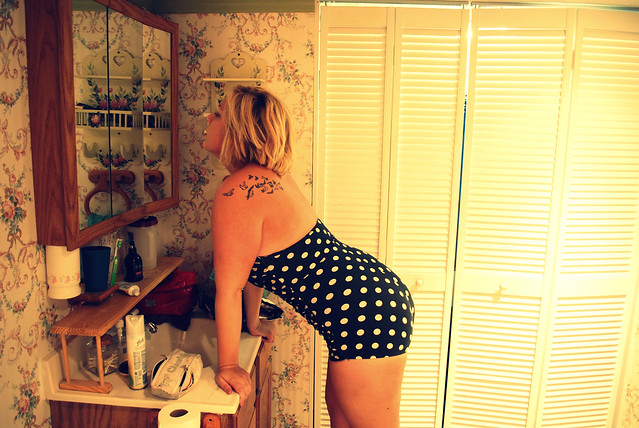This article is written in partnership with Noom—they’re dedicated to making healthy living easier for us all, and we’re honored to work with them. ~ ed.
If my relationship with my body had a Facebook status, it would be: it’s complicated.
Of course, I’m not alone.
And, who can blame us with all the powerful, conflicting messages raining down on our psyches from every corner of influence, beginning when we’re barely old enough to recognize our own reflections?
We’re praised for being pretty, cute, thin, small. But if we’re real, raw, loud, big, that’s often a problem.
The message that our worth is related to our appearance is something many of us heard in a thousand different ways, growing up, and it probably wasn’t even intentional most of the time—just programming traveling down through the generations.
Start reprogramming your beliefs about your body & food >>
“What a pretty dress!”
“Don’t you look lovely today?!”
And, as an adult:
“You’ve lost weight! You’re looking great.”
“You bounced back from having a baby so fast. Well done!”
We’re conditioned to value our appearance against a very particular, size-based standard of beauty. And so, we’re left caring about how we look above all else and hating how we look at the same time. Because, no matter how hard we try or how “lucky” we are with our genes, we will inevitably fail to match up to the imposed standard.
None of us are immune. My own white skin, naturally athletic build, and able-bodied-ness don’t spare me. Even after running 20 kilometers comfortably, I still stand in the shower afterward, unkindly pinching the belly fat I just can’t seem to shift since having children.
I know I should be loving myself, feeling grateful for what my body can do, but the programming runs deep.
The thing with subconscious beliefs is that we can’t erase them. Instead, we need to replace them with alternative messages—messages of kindness, compassion, and self-acceptance.
Like most things, our relationship with our bodies—and subsequently, our habits with regard to our bodily health and well-being—starts in the mind.
This is one of the reasons we hold respect for our long-time partner, Noom’s philosophy. They understand that our actions (whether comfort-eating, or beating ourselves up for falling off the health wagon) start with our emotions, which start with our thoughts.
Take a 30-second, psychology-based health evaluation >>
So it makes sense that, to heal our toxic relationship with our bodies, we need to begin with the thoughts we’re having about our bodies, and about how we fuel them and care for them.
Creating a Body Love Mantra: Why & How to Do It.
Noom is big on creating mantras that you can hang on to and use to keep yourself motivated and empowered throughout your journey to a more healthful and meaningful life.
Mantras aren’t just for zenned-out, barefooted, hemp-wearing yogis. They’re actually a really practical psychological tool everyone can, and should, use. The Sanskrit word literally means tool for the mind: manas (mind) + tra (tool).
A mantra can be anything from a full-on, lyrical recitation in Sanskrit (if that’s your jam) or just a single word that reminds you of what’s meaningful in your life.
If you want to stay traditional, you can repeat your mantra during or after meditation. But you can also use it at any time of day when you want to recenter, refocus, and let go of some negative mental chatter.
Of course, you could choose something generic, but a mantra that feels applicable to your life and truly inspires you is much more effective.
So, to begin creating your own, it can be helpful to reflect on what is most important to you in life. And to create a body love mantra, in particular, you need to think about what is most unique and worth celebrating about your body.
Consider the following questions:
- What makes you uniquely you, from a physical perspective? (It could be your millions of freckles; your one short toe; your crazy, curly, glorious locks; or even your killer tats.)
- What’s something your body can or has done that makes you proud? (Anything goes, from strong arms that can cuddle your children or loved ones tight to powerful lungs that can sing loudly in the kitchen.)
- What’s something you enjoyed doing with your body when you were younger, and probably a little less self-aware? (Running, jumping, climbing, cartwheeling…)
- What’s something about your body that you’re grateful for? (Trust me, if you have mobility and health, to any degree, there’s always something to be grateful for.)
- What’s something about you that others have said they find sexy/interesting/cute/charming/amazing/attractive (no matter how quirky or weird)?
These questions are meant to help start the wheels churning on what’s intrinsically beautiful and unique and worthy of celebration and adoration about you, rather than any extrinsic beauty standards.
Train your mind for healthier habits & rebuild your self-image >>

As you reflect on these questions, try noting words that you come up with or resonate with you, such as powerful, soft, adorable, fast, healthy, fierce, life-giving, kissable, cuddly, capable.
These can help form a strong base for a mantra that’s uniquely you. A mantra can take many different forms depending on what you are looking for. They can take a more affirmation-like form such as stating “I am” or “My body is” and inserting an inspiring message after, such as “beautiful at any size,” “worthy of unconditional love,” “healthy and capable,” “proud of my scars”…or anything that pertains to you.
Another option is to create a mantra with simply a phrase, word, or statement that inspires you and keeps you grounded in kindness and compassion toward your body. These can be varied, as everyone’s hang-ups and negative self-talk are different. The key is to keep it simple so you can remember it easily and draw upon it when you need to. Something like “I love my whole self,” “I’m grateful for what my body can do,” or just “sexy beast!”
You may find it helpful to write your mantra down and put it somewhere you can see it at a time or place when and where you usually engage in self-criticism. For me, that’d be my bathroom mirror to see before I get into the shower. Use it as a positive visual reminder of what’s worthy and whole and wonderful about your body.
No matter what type you create, research has found that using a silent mantra activates certain parts of the brain that are also activated during meditation practice.
Mantras help with focusing on what is important and keeping your eyes on the big picture or on what truly matters in any given situation.
In the case of body love, it helps us remember that this body of ours is worth more than the flaws we’ve taken to focusing on.
It’s our only home, a living record of those many generations who loved and lost and went before us, a vessel through which we experience this life, a divine machine that is capable of so much more than just fitting into the “right” size jeans, whatever those are anyway.
If you’re looking for more inspiration and support on your journey to better health, start your 14-day Noom trial.



Read 3 comments and reply